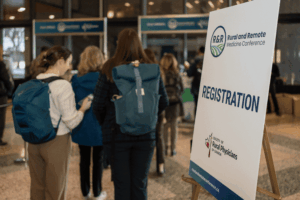For Immediate Release
Society of Rural Physicians of Canada Calls on Ontario to Reconsider CaRMS Policy on International Medical Graduates
October 16, 2025 – Shawville, Quebec
The Society of Rural Physicians of Canada (SRPC) joins the Canadian Medical Association (CMA) and the College of Family Physicians of Canada (CFPC) in urging the Ontario government to immediately reconsider its newly announced policy restricting international medical graduates (IMGs) from applying in the first round of the 2026 residency match unless they completed at least two years of high school in Ontario.
“This decision creates unnecessary barriers for skilled physicians who are already Canadian citizens or permanent residents and who want to practise in Ontario,” said Dr. Sarah Giles President-elect of the SRPC who is based in Northwestern Ontario. “Many internationally trained medical graduates have deep community roots and the skills needed to provide care in rural and northern areas where shortages are most severe, but they may not have attended high school in Ontario for a variety of reasons.”
Across Canada, more than 6.5 million people lack a family doctor, and the crisis is particularly acute in rural, remote, and Indigenous communities. Internationally trained physicians are a vital part of the rural medical workforce: nearly one-third of Canada’s family doctors received their training abroad. Restricting the first round of CaRMS access for these applicants may risk deepening inequities in health care access for rural Ontarians.
The SRPC echoes the call of national physician organizations for the Ontario government to postpone this policy until full consultation with stakeholders can occur, including IMG representatives, health educators, and rural communities that depend on skilled physicians and particularly those who train in family medicine.
Ontario has historically been a leader in welcoming international medical graduates. Reversing that tradition threatens progress toward building a sustainable, equitable health workforce.
“The SRPC believes that every qualified physician who wishes to serve Canadians, especially those in rural and remote areas, should have a fair opportunity to do so,” said Dr. Giles “Rural patients deserve timely access to care, not more barriers in the system.”
About the Society of Rural Physicians of Canada (SRPC)
The SRPC is the national voice of rural physicians, working to improve the health of rural Canadians through advocacy, education, and research. Representing over 3,000 members, the SRPC promotes equitable access to high-quality health care and supports the recruitment, retention, and professional development of rural generalist physicians across Canada.










